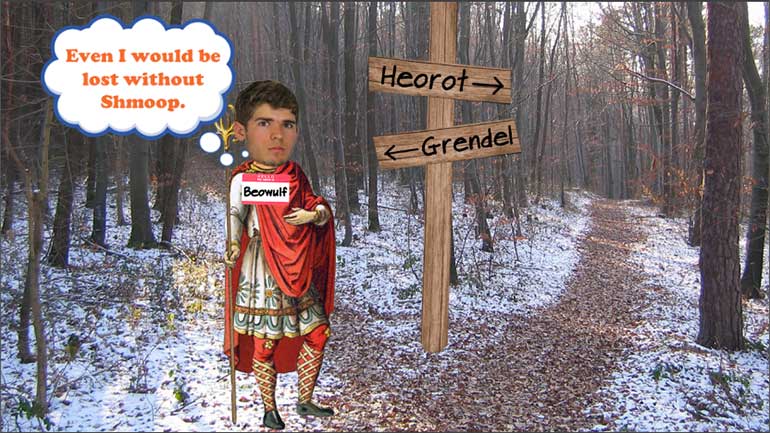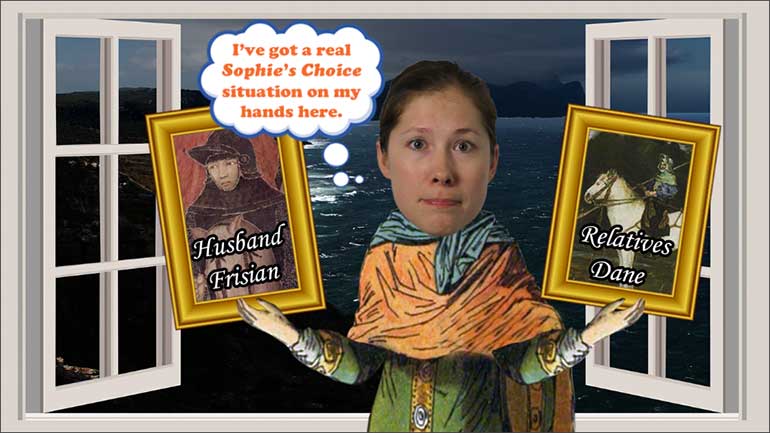ShmoopTube
Where Monty Python meets your 10th grade teacher.
Search Thousands of Shmoop Videos
Playlist Beowulf: Shmoopversations 11 videos
Who is it about? Who told it? Who wrote it? Who are we? What’s the meaning of life? Do you know the Muffin Man? All these answers and more can be...
Old English is just English, right? Can’t be more difficult than reading Shakespeare, right? Hah. Yeah...no. Click on the video to find why tra...
Course Introduction to Beowulf 2121 Views
Share It!
Transcript
- 00:01
We speak student!
- 00:04
Beowulf a la Shmoop
- 00:06
An Introduction
- 00:09
And welcome to Beowulf a la Shmoop.
- 00:12
Here we go.
Full Transcript
- 00:13
"Hwaet! We gardena in geardagum
- 00:16
peodcyninga prym gefrunon
- 00:19
hu oa aepelingas ellen fremedon!"
- 00:22
And that was not Klingon; that was actually
- 00:25
English in the era of Beowulf.
- 00:27
And good luck spelling all that.
- 00:29
So, we're here with Dr. Deb talking about this.
- 00:32
Beowulf's considered the first great work of literature
- 00:34
written in the English language.
- 00:36
And that was the English language, not Klingon.
- 00:38
But you'll notice pretty quickly,
- 00:40
this is not the English we use today.
- 00:43
It's Old English.
- 00:44
Which is just bizarre stuff.
- 00:48
But, Deb, so why don't you give us
- 00:50
context of the era and what we should expect
- 00:52
from a reading of Beowulf
- 00:54
and why you need Shmoop so badly
- 00:56
when you do read Beowulf.
- 00:57
Sure, well, I mean, the first thing you mentioned is
- 00:59
it's written in Old English.
- 01:01
And, just to kind of give a little background on what that means.
- 01:03
Before the Norman conquest in 1066,
- 01:08
we were not speaking in English that sounds anything like
- 01:11
it sounds today.
- 01:13
The Norman Conquest brought in a lot of, like,
- 01:15
French-iness into the language.
- 01:16
So, Old English is very Germanic.
- 01:19
So it has German, Latin, Norse, Scandinavian sounds in it.
- 01:24
So, yeah, basically it sounds like someone is sneezing.
- 01:26
And for those of us who missed school that day,
- 01:28
the Norman conquest is the Nordic tribes
- 01:32
coming down, basically taking over what's now England.
- 01:36
And that was kind -- And then King William emerged from that.
- 01:39
Yeah, and this all happened in 1066,
- 01:42
so we'll talk a little bit about how Beowulf
- 01:44
is really centered right in the middle of that.
- 01:47
Because Beowulf was told before the Norman conquest,
- 01:50
but then it was written down after.
- 01:52
So we'll talk a little bit about that play,
- 01:54
but the historical conquest is important to keep in mind
- 01:56
as we read.
- 01:57
Great. Tell us a little about a day in the life of.
- 02:00
Because, just living in this era,
- 02:02
feels like it's an important element
- 02:04
of the story and the context of things.
- 02:07
Like, what was a day in the life?
- 02:09
Yeah, well, what we wanna remember is that
- 02:10
Beowulf is an epic poem.
- 02:12
So it really isn't about a day in the life.
- 02:14
It's about a day in the life of someone incredibly important.
- 02:18
Epic poems tend to be about
- 02:20
big, heroic rulers.
- 02:23
And this is, you know, an epic poem at its best.
- 02:25
It's about heroism; it's about really showing the cultural values
- 02:31
of the ruling class.
- 02:32
It's written in an elevated style; there's supernatural things
- 02:36
going on...
- 02:38
And through all this,
- 02:39
we're able to see what was most important
- 02:41
to the people who were telling this story.
- 02:43
So, yeah, when you read Beowulf, you don't really get
- 02:47
the idea of what a day in the life was for, you know,
- 02:49
Joe Schmoe in the fifth century.
- 02:53
Or, you know, the eighth, ninth, tenth, eleventh century
- 02:55
when it was written.
- 02:56
But instead you get a day in the life of, you know,
- 03:00
a hero who fights monsters.
- 03:01
So it's a little different.
- 03:07
What can we expect from a reading of Beowulf?
- 03:10
What's the historical context of Old English?
- 03:14
How did the English language change after the Norman conquest?
- 03:18
Is Beowulf a day in the life story? Why or why not?
- 03:25
And that was the English language, not Klingon.










